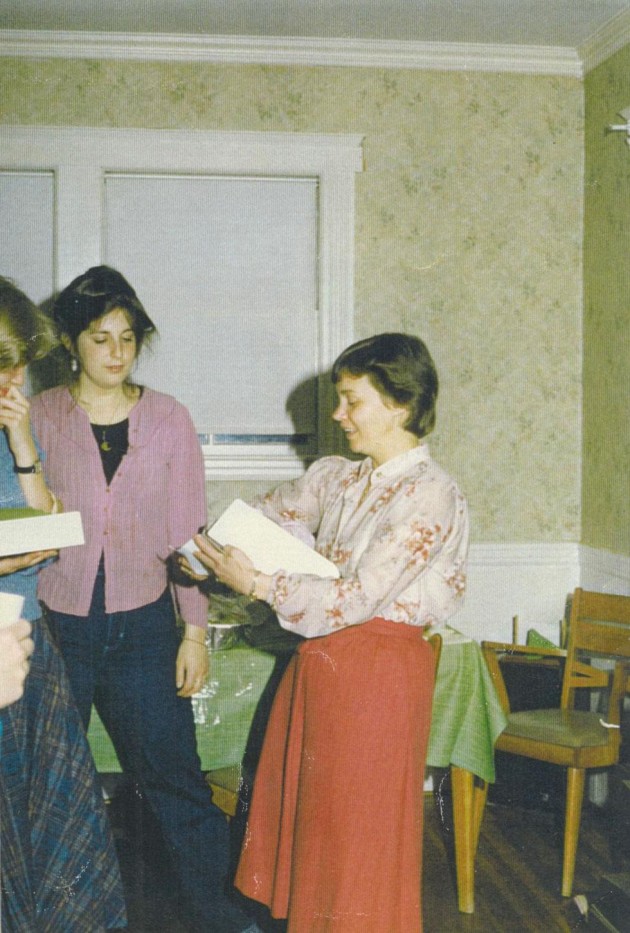Social work profs, students change lives

It’s the 1970s and Lillian Jackson is walking down Dwight Street in Boston’s impoverished south end. She hears 12-year-old Alan, an abused child living with a drunk, calling her name from a window. He’s drinking out of a beer in a paper bag while waving to her. She looks up, smiles and responds with “One day I’m going to get you, Alan.” He responds “no you’re not.”
Eventually, she did get him and he became one of the 6,000 teenagers she helped in the first Boston runaway home. Teens would come from all over the country to escape drugs, abuse, neglect, gangs and to avoid detention centers.
Lillian Jackson is a professor of social work at Castleton State College. After working in the field for 31 years, she took her current position and teaches courses including social welfare policy and social work practice.
The social work profession deals with heavy issues day in and day out. It is emotionally stressful and mentally taxing, she said.
“In social work, our client is not just the person sitting in front of you,” she said. “It’s their community and the entire country – all the policies.”
Social work requires lots of schoolwork and on the job training. Not only do these professionals need to know about personal issues, they must know about government policy and be ready to deal with anything thrown their way. Field experience and applying what is learned in the classroom is what prepares them.
“You can’t be prepared at school until you actually do it,” said Amanda Brophy, a recent graduate of Castleton’s social work program. “Knowing what to say and how to react is difficult and I didn’t feel fully prepared. I did in my school work, but not in-field experience.”
Luther Brown, also a social work professor, knows all about not being fully ready to deal with the curve balls clients throw his way.
Years ago, he made a house call to a schizophrenic client. As he began to speak with her, he sensed her agitation toward his questions. She left the room and came back with a kitchen knife ranting at him. As he sat there, he could think of only one thing to do: talk about the client’s baby lying in the crib to calm her down.
This was the only way he could ease toward the door to escape.
“Our profession is a combination of science and humanism,” he said.
Jackson and Brown say social work takes a certain type of person. Both agree empathy is key.
“It’s who I am,” Jackson said. “You have to get very upset about conditions … You’ve got to have a passion for this. And you have to vote; you have to be very involved with politics.”
Amanda Brophy’s mother, Maryann, knows what her daughter does is a great thing, but she can’t help but worry.
“Amanda has always wanted to help people, especially kids,” she said. “Sometimes she tells me stories about work and what some clients do and I get scared for her. She’s so little.”
In her two years since graduation, the 5-foot-3 Brophy has worked with mentally ill adults and high school dropout teen moms. Her ways of separating work life from personal life include a life outside work and a support system of family and friends.
Jackson said she gives that advice to all of her students; have someone to talk to, whether it’s a colleague or family.
Not all clients’ stories are negative though. Brophy talks of how her current job at Springfield Area Parent/Child Center is helping Daniel, an abused foster child. When he came in as a 2-year-old, he would only make grunting noises. As the child of alcoholics, he was put into foster care and is in his third home, where things are beginning to look up.
“He’s progressed so much,” she said. “Now, only a few months later, he’s beginning to talk. He’s still skittish about having his diaper changed and loud noises, but he’s becoming a more average 2-year-old. We call people like him ‘survivors.'”
Social work student, Kristen Kaigle, shares Brophy’s passion for social work.
“It’s difficult, but it’s rewarding to see people change and improve,” Kaigle said.
If it wasn’t rewarding, people like Jackson and Brown wouldn’t have been in the field as long as they have.
It’s those like Daniel and Alan who make the demands so worth it for them.
“Alan still stays in touch,” Jackson said, pulling out a card from him. The excitement in her expression is evident and timeless.
“Thanks for not giving up on me as a young boy as so many other people did,” Alan wrote.






